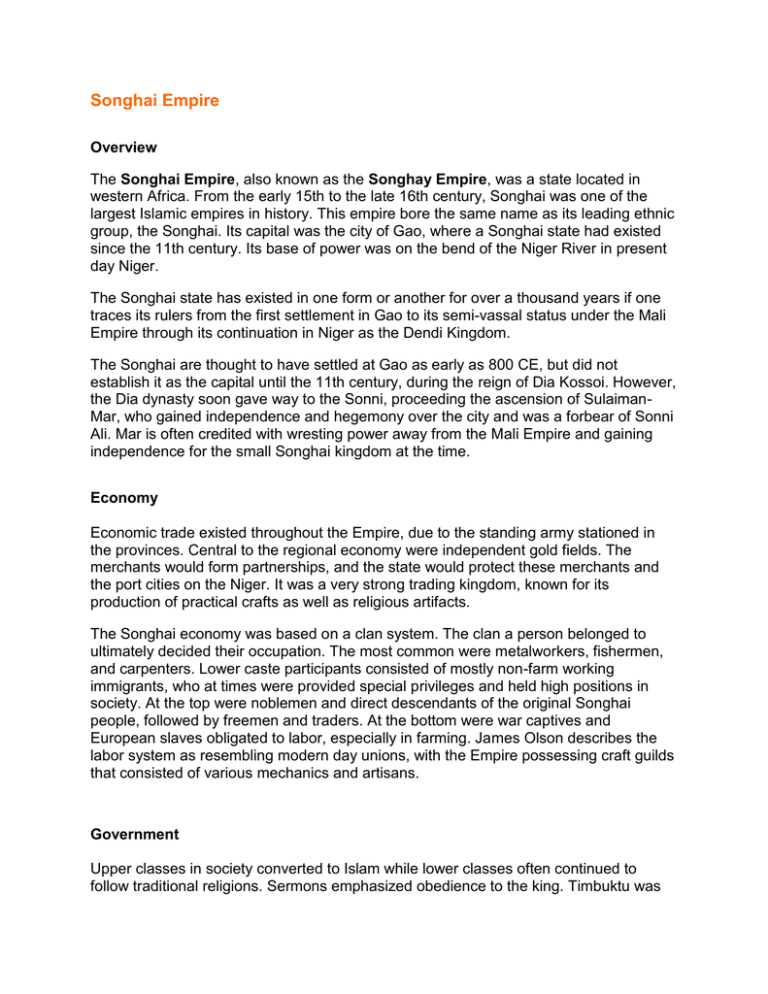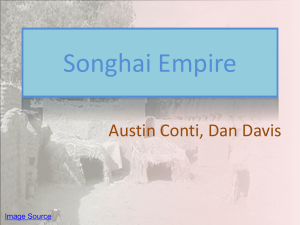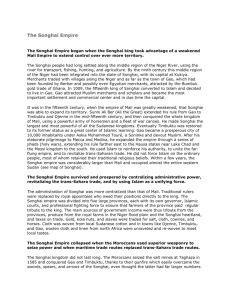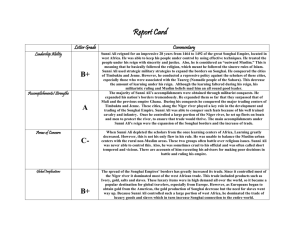Songhai Empire: History, Economy, and Decline
advertisement

Songhai Empire Overview The Songhai Empire, also known as the Songhay Empire, was a state located in western Africa. From the early 15th to the late 16th century, Songhai was one of the largest Islamic empires in history. This empire bore the same name as its leading ethnic group, the Songhai. Its capital was the city of Gao, where a Songhai state had existed since the 11th century. Its base of power was on the bend of the Niger River in present day Niger. The Songhai state has existed in one form or another for over a thousand years if one traces its rulers from the first settlement in Gao to its semi-vassal status under the Mali Empire through its continuation in Niger as the Dendi Kingdom. The Songhai are thought to have settled at Gao as early as 800 CE, but did not establish it as the capital until the 11th century, during the reign of Dia Kossoi. However, the Dia dynasty soon gave way to the Sonni, proceeding the ascension of SulaimanMar, who gained independence and hegemony over the city and was a forbear of Sonni Ali. Mar is often credited with wresting power away from the Mali Empire and gaining independence for the small Songhai kingdom at the time. Economy Economic trade existed throughout the Empire, due to the standing army stationed in the provinces. Central to the regional economy were independent gold fields. The merchants would form partnerships, and the state would protect these merchants and the port cities on the Niger. It was a very strong trading kingdom, known for its production of practical crafts as well as religious artifacts. The Songhai economy was based on a clan system. The clan a person belonged to ultimately decided their occupation. The most common were metalworkers, fishermen, and carpenters. Lower caste participants consisted of mostly non-farm working immigrants, who at times were provided special privileges and held high positions in society. At the top were noblemen and direct descendants of the original Songhai people, followed by freemen and traders. At the bottom were war captives and European slaves obligated to labor, especially in farming. James Olson describes the labor system as resembling modern day unions, with the Empire possessing craft guilds that consisted of various mechanics and artisans. Government Upper classes in society converted to Islam while lower classes often continued to follow traditional religions. Sermons emphasized obedience to the king. Timbuktu was the educational capital. Sonni Ali established a system of government under the royal court, later to be expanded by Askia Muhammad, which appointed governors and mayors to preside over local tributary states, situated around the Niger valley. Local chiefs were still granted authority over their respective domains as long as they did not undermine Songhai policy. Tax was imposed onto peripheral chiefdoms and provinces to ensure the dominance of Songhai, and in return these provinces were given almost complete autonomy. Songhai rulers only intervened in the affairs of these neighboring states when a situation became volatile; usually an isolated incident. Each town was represented by government officials, holding positions and responsibilities similar to today's central bureaucrats. Under Askia Muhammad, the Empire saw increased centralization. He encouraged learning in Timbuktu by rewarding its professors with larger pensions as an incentive. He also established an order of precedence and protocol and was noted as a noble man who gave back generously to the poor. Under his policies, Muhammad brought much stability to Songhai. Decline Following the death of the Emperor Askia Daoud, a civil war of succession weakened the Empire, leading the sultan of the Saadi Dynasty of Morocco to dispatch an invasion force (years earlier, armies from Portugal had attacked Morroco, and failed miserably, but the Morrocan coffers were on the verge of economic depletion and bankruptcy, as they needed to pay for the defenses used to hold off the siege). Judar Pasha was a Spaniard by birth, but had been captured as an infant and educated at the Saadi court. After a march across the Sahara desert, Judar's forces captured, plundered, and razed the salt mines at Taghaza and moved on to Gao. When the Emperor met Judar at the 1591 Battle of Tondibi, Songhai forces, despite vastly superior numbers, were routed by a cattle stampede triggered by the Saadi's gunpowder weapons. Judar proceeded to sack Gao destroying the Songhai as a regional power. Governing so vast an empire proved too much for the Saadi Dynasty however, and they soon relinquished control of the region, letting it splinter into dozens of smaller kingdoms. The Songhai people themselves established the Dendi Kingdom.






